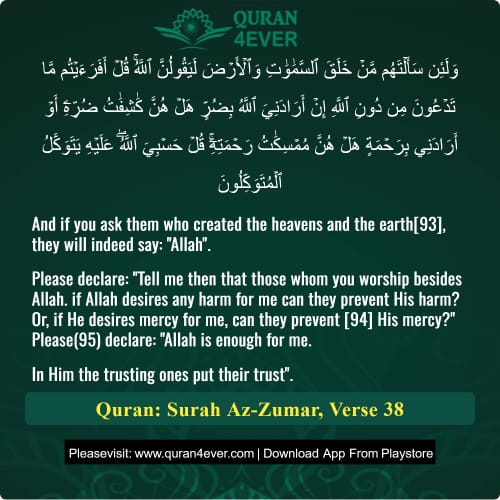
Transliteration:( Wa la'in sa altahum man khalaqas samaawaati wal arda la yaqoolunal laah; qul afara'aitum maa tad'oona min doonil laahi in araadaniyal laahu bidurrin hal hunna kaashi faatu durriheee aw araadanee birahmatin hal hunna mumsikaatu rahmatih; qul hasbiyal laahu 'alaihi yatawakkalul mutawakkiloon )
"And if you ask them who created the heavens and the earth [93], they will indeed say: 'Allah'. Please declare: 'Tell me then that those whom you worship besides Allah — if Allah desires any harm for me, can they prevent His harm? Or, if He desires mercy for me, can they prevent [94] His mercy?' Please declare: 'Allah is enough for me. In Him the trusting ones put their trust'."
[93] This verse refers to those polytheists of Arabia who, despite believing that Allah is the Creator of the heavens and the earth, still associated others with Him in worship. Their contradiction is exposed—they accepted Allah's sovereignty, yet they equated idols to Him in certain aspects. This act made them mushrik (polytheists). As mentioned elsewhere:
"Yet the disbelievers ascribe equals to their Lord." (Surah Al-An‘am: 1)
On the Day of Judgment, they will themselves admit:
"By Allah, we were certainly in clear error, when we equated you (idols) with the Lord of the worlds." (Surah Ash-Shu‘ara: 97–98)
[94] These idolaters falsely claimed that while their idols had no independent power, they could mediate with Allah to deflect His wrath or bring His mercy. They imagined that, like a king needing ministers, Allah too required helpers. But the Qur'an makes it clear:
"All praise is due to Allah, Who has not taken a son, and Who has no partner in His Kingdom, nor does He need a protector due to weakness. So, proclaim His greatness." (Surah Al-Isra: 111)
Thus, the idea that anyone other than Allah can control harm or mercy is utterly baseless and rejected.
[95] The verse concludes with the declaration:
"Allah is enough for me."
This affirms the absolute tawakkul (trust) that a believer, especially the Prophet ﷺ, places in Allah. It also connects to the earlier verse:
"O Prophet! Allah is sufficient for you and for the believers who follow you." (Surah Al-Anfal: 64)
This tells us that any help from creation is, in reality, help from Allah, and does not contradict the concept of Divine sufficiency. Hence, Allah alone is the source of protection, mercy, and support, and He alone deserves our full trust.
The tafsir of Surah Az-Zumar verse 38 by Ibn Kathir is unavailable here.
Please refer to Surah Zumar ayat 36 which provides the complete commentary from verse 36 through 40.
(39:38) If you ask them: “Who created the heavens and the earth?” they will surely answer: “Allah.” Tell them: “What do you think, then, of the deities whom you call upon instead of Allah? If Allah should will that an affliction befall me, will those deities remove the harm inflicted by Him? Or if Allah should will that I receive (His) Mercy, will they be able to withhold His Mercy from me?” Say: “Allah is sufficient for me; those who have to put their trust, let them put their trust in Him.[57]
57. Ibn Abi Hatim has related from Ibn Abbas that the Prophet (peace be upon him) said: The person who desires that he should become most powerful among men should repose his trust in Allah. And the person who desires that he should become the wealthiest among men should have more trust in that which is with Allah than that which is in his own hand. And the person who desires that he should become most honorable among men should fear Allah All- Mighty.
[1351]- i.e., "Tell me about..."

For a faster and smoother experience,
install our mobile app now.
Related Ayat(Verses)/Topics